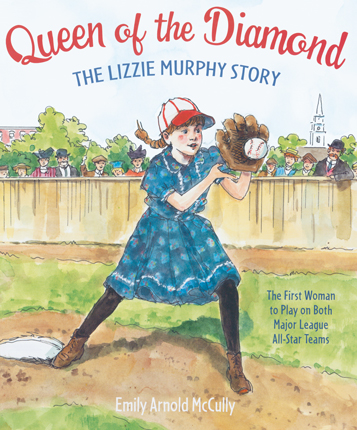Full Text Reviews: School Library Journal - 11/01/2014 Gr 1–3—McCully takes a brief look at the career of Lizzie Murphy, the first woman to play in a major-league exhibition game and the first person to play on the New England and American leagues' all-star teams. This story begins in 1900 in Warren, RI, when Murphy's father, who played amateur baseball, declared her a natural at age six. Murphy played catch with her brother, Henry, who was on a local team, but she wanted to play first base. Though her mother voiced the prevailing sentiment of the day ("'It's not a game for girls'"), Murphy persevered and convinced the captain of her brother's team to let her play when she was eight. Life was not easy in the 1900s, and by age 12, the girl was working in the mills, but she was still athletic, swimming, running, and playing ice hockey. By age 15, she was a regular on two amateur teams, and at 18, she had a contract. When the manager tried to cheat her out of her pay, Murphy's cleverness and determination took over; she was never short-changed again and played professional ball for the next 17 years. Realistic drawings in acrylic ink reflect the attire of the times, particularly Murphy in her feminine dresses. The scenes that show her being shunned and then gradually accepted by the boys are particularly well done. The dialogue-heavy narrative and subject matter will easily appeal to readers. McCully's book is both a good all-round baseball story and an inspirational story about believing in oneself and overcoming opposition. An excellent choice.—Roxanne Burg, Orange County Public Library, CA - Copyright 2014 Publishers Weekly, Library Journal and/or School Library Journal used with permission. Booklist - 12/01/2014 In Rhode Island in the early 1900s, six-year-old Lizzie Murphy played catch with her brother and aspired to play first base. Later, she tagged along as batboy for his baseball team, until she finally got her chance to wow the other players with her fielding and hitting. Even after she began working at a textile mill, she still found time for baseball. At 18, Lizzie joined a semipro team, where she demanded and received equal pay. Mrs. Murphy’s fears that her daughter would not be able to support herself (she did) and that she might never marry (she did) may have sowed some doubts, but not for long. Murphy played professionally for 17 years and became known as the Queen of Baseball. Caldecott medalist McCully tells this compelling story skillfully. The gradual growth of the character is particularly well done in the lively ink drawings with watercolor washes, which bring Murphy and her era sharply into focus. An author’s note includes details of Murphy’s career and a photo of the player. A rewarding sports biography. - Copyright 2014 Booklist. Bulletin for the Center... - 04/01/2015 Lizzie Murphy, who played first base in semi-professional ball at the beginning of the twentieth century, was unquestionably a baseball pioneer-the first woman to play against major leaguers in an exhibition game; the first player to participate in all-star games in both leagues; the first woman (and white, at that) to play in a Negro League game. Although most of these facts are included in McCully’s closing notes, the text is more concerned with Lizzie’s childhood and the launch of her career. Readers meet a talented little girl, an all-round athlete, who elbowed her way into her big brother’s games by toting around the equipment and waiting for her break. Against the advice of her mother, who appreciated her daughter’s talent but saw no future in women’s baseball, Lizzie made it onto a men’s semi-pro team and, as McCully’s narration showcases as its climax, challenged the team’s manager to pay her the wages he withheld from her debut appearance. This focus subtly extends the story’s interest from a girl-makes-good historical set piece to an accessible bit of consciousness-raising regarding gender and wage parity; Lizzie was the team star-and certainly not above making money on the side selling her own baseball cards-but wasn’t about to fall for a manager’s argument that “you’ll quit to get married someday. These fellows have to earn a living.” Line and watercolor paintings convey the Rhode Island environment in which Lizzie got her start, as well as the contrast between her shirtwaist and boater everyday garb and the men’s uniform she audaciously wore on the field. A brief list of sources is included. EB - Copyright 2015 The Board of Trustees of the University of Illinois. Loading...
|



